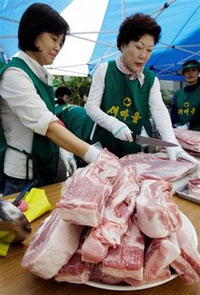
|  |  |  Business News | May 2009 Business News | May 2009  
Mexico Says Pork Import Bans Unjustified, Illegal
 Laura MacInnis - Reuters Laura MacInnis - Reuters
go to original


| | South Korean women cook pork during a campaign for the consumption of pork whose prices have nosedived afte reports about swine flu, in Seoul, South Korea, Monday, May 4, 2009. South Korea confirmed Asia's second case of the disease over the weekend, but said Monday that the woman — a nun who had visited Mexico - already had recovered. (AP/Lee Jin-man) |  |
Geneva - Mexico called on its trading partners on Tuesday to repeal all pork import bans imposed as a result of H1N1 flu virus fears, saying the restrictions had no scientific grounds and violated international trade rules.

In a statement to the World Trade Organisation (WTO), obtained by Reuters, Mexico said it was "deeply disappointed" about bans slapped on its meat in response to the virus that experts say is spread through the air and is not food-borne.

More than 1,000 people have been infected with the flu strain whose emergence has raised global pandemic fears. All but one of the 26 confirmed deaths have been in Mexico, considered the epicentre of the outbreak.

"Mexico is concerned about the diverse measures that some members of the WTO have adopted against pork product imports from Mexico, using as a reason the outbreak of the A/H1N1 virus," the document stated.

"Mexico urgently requests all its trading partners to eliminate any restrictive measures established on Mexican products, which are not in accordance with the scientific information available or with their international obligations."

Global trade in pork meat is worth about $26 billion a year. Mexico is one of the top worldwide exporters, along with the United States, European Union, Canada, and Brazil.

As many as 20 countries, including Russia and China, two of the world's largest pork importers, have banned Mexican meat products in response to the virus popularly known as "swine flu", which has also depressed the market price of hogs.

'TOTALLY NEGLIGIBLE' RISK

Exports from the United States and Canada have also been hit by restrictions, while some governments have moved to block live animals and meat from all the countries that have reported flu infections. The European Commission said earlier on Monday it had written to Russia to contest a ban by Moscow on imports of pork products from some EU countries.

Under international trade rules, countries are allowed to stop imports of goods if they can show they pose health risks or fall short of sanitary standards.

Many disputes arbitrated at the WTO are related to arguments over whether governments have used such health concerns as a pretext to unfairly restrict trade or shield their own producers from competition.

If the trade bans are not dropped, Mexico could eventually file a dispute to protest and retaliate against them at the WTO. Of the countries that have restricted pork trade, only Russia is not a WTO member.

Earlier on Tuesday, the Food and Agriculture Organisation (FAO) described the risk that pork and pork products could carry the new virus as "totally negligible."

"No influenza virus in pigs has ever been detected in meat or meat products," Joseph Domenech, the FAO's chief veterinary officer, told Reuters.

The World Organisation for Animal Health (OIE) also said there was no reason to restrict trade as a result of the virus, which scientists say is genetically a mixture of two swine flu strains, with bits of human and bird genetic material.

"The OIE is very concerned that differences are being made between cooked and not cooked meat. All pork products are safe for consumption. There is no difference," said Alex Thiermann, senior adviser to the OIE director-general.

Canada, which on Saturday reported the first known infection of H1N1 in a pig herd, has also denounced the pork trade bans.

Canada's trade minister Stockwell Day called on governments on Monday to "make decisions that are scientifically based".

"We would expect those countries, which have gone ahead with the ban or were thinking about it, would stop and have a look at scientific guidelines and would recognise that the meat itself is not a problem," Day said.

In its document presented to the WTO, Mexico said no virus had been discovered among its pigs, while also stressing the strain posed no threat to the food supply.

"Mexico will continue to promote the consumption of pork meat from Mexico, domestically and abroad," it said.

(Additional reporting by Silvia Aloisi in Rome, Sybille de la Hamaide in Paris, and Nerijus Adomaitis in Vilnius; Editing by Stephanie Nebehay and Mark Trevelyan) |

 |
|  |



